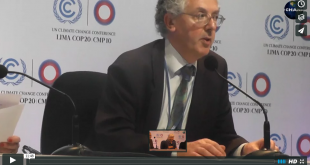In this presentation of Climate Matters.TV ~ Part 1, Stuart Scott (UPFSI) talks with Prof. Peter Wadhams (Expeditionary Arctic Researcher and Emeritus Prof. of Ocean Physics from Cambridge University), on the Consequences of Vanishing Arctic Ice and subsequent global impacts and feedback effects like greater heating and sea level rise on the planet.
Scott introduces Peter Wadhams latest book, ‘A Farewell to Ice’ including a short summary on Wadhams nuclear submarine excursions under the Arctic ice packs over 4 decades, mapping the loss of ice volumes, extent and thickness, in a way that satellite and remote observations could not do, which have since continued being recorded, but by unmanned research modules as a result of a fire disaster on one of the submarines in 2007. He continues with a quick review of sonar plots showing ice thickness on undersea ranges and packs, highlighting the fact that the ‘multi-year ice’ is vanishing, including a graph depicting the exponential decline of Arctic ice from 1975 to 2015.
Prof. Wadhams expands further by explaining the rapid ice retreat and ice volumes thinning and declining over the years and how expedition conditions have changed over the last few years, where previously scientists would work from a base ice camp on the thick stable ice, they now have to “freeze” a vessel into the ice or make use of satellite track buoys, i.e. installing instrumentation in and on the ice which transmits data back via satellite, due to the breakup of the ice packs making them highly unstable and dangerous to work on. (Read more on ice-arc.eu/)
He expands further on the retreat of sea-ice and ice melts having further impacts and feedback effects, making the overall global effect of sea-ice retreat much worse resulting in a greater heating effect on the planet, as well as loss of ‘convective chimneys’ in Greenland sea and the resultant impacts on rest of Europe via the global conveyor belt, i.e. Gulf Stream, etc.
Stuart introduces the issue of the ‘disconnect between climate models and real-world observations’, which Wadhams expands on by explaining the difference between IPCC models and real world data from observation scientists, data which calls into question many of the models of polar ice upon which existing climate predictions, including the IPCC reports, are made. He talks further on the ongoing medium to deep sea methane releases from caps of permafrost at Arctic and Antarctic.
Stuart introduces a video presentation of a statement by Wadhams taken at an interview before the Paris Agreement (2015), concerning ‘Conspiracy Complacency throughout the world’, in which he stated that his theory is “that the current generation of world leaders, politicians and the like, are too cowardly to take any action now, as any action would involve such a large disruption of our present way of life, that they don’t want to take it, because they might not get re-elected” (Wadhams), which he retracts to a certain extent since the Paris Agreement, but with the 1.5-2.0 degree increased temperature by 2020 already impacting the planet at this point, Wadhams feels that mankind is going to have to look at alternatives like ‘Direct Air Capture’-CCS (ccsassociation.org/why-ccs/tackling-climate-change/) and/or ‘GeoEngineering’ (geoengineeringwatch.org/), etc. in order to technically reduce carbon dioxide levels in the atmosphere.
Stuart closed off by stating that the Paris Agreement may yet be severely undermined by the recent change in administration of the United States and feels that there is a compromise happening as governments are still too beholden to economic interests, trying to keep their economies growing exponentially (GDP) – which Stuart sees as a ‘Conflict in Society’! Once we lose the Arctic ice sheet the heating of the planet will accelerate, something that should by all rights be keeping world leaders awake at night!
Scott gives thanks to following groups for their support of his presentations, i.e.
* Abibimman Foundation, Tzu Chi Foundation and the Intl. Society for Ecological Economics and introduces a ‘Quick and Easy Way to Change the World’ – website: Nobel Peace Prize for Sustainable Development (NP4SD.org.)
Links:
iceshelf.wordpress.com/ On Thin Ice ~ Expedition to a crumbling Antarctic shelf
nsidc.org/arcticseaicenews/ NSIDC – Arctic Sea Ice maximum at record low for 3rd straight year
nsidc.org/cryosphere/icelights/2012/03/arctic-sea-ice-maximum NSIDC – The Arctic Sea-Ice Maximum





One comment
Pingback: "SMALL" Changes In Global Sea Rise…..CATASTROPHIC Implications! – Mother Channel